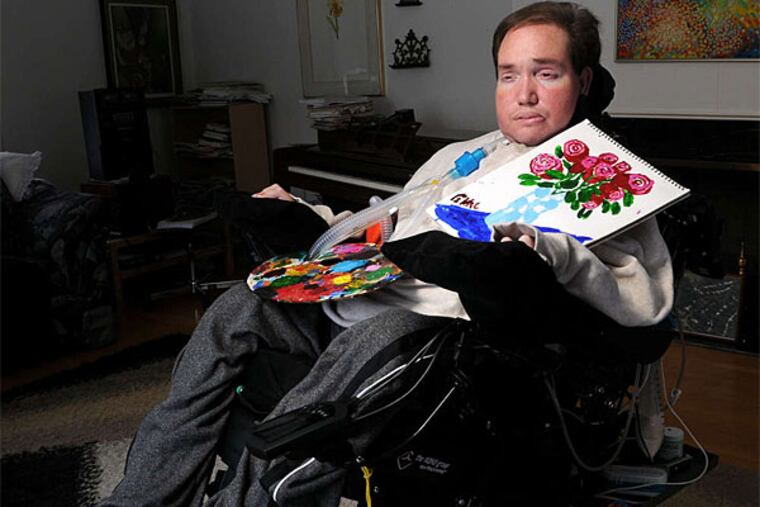A rabbi's struggle with tragedy, encounters with joy
Growing up in the '50s in the Jewish neighborhood then centered on Rising Sun Avenue and Roosevelt Boulevard, Charles Sherman had an insulated, even charmed, childhood.

Growing up in the '50s in the Jewish neighborhood then centered on Rising Sun Avenue and Roosevelt Boulevard, Charles Sherman had an insulated, even charmed, childhood.
"My whole life as a kid was within three blocks," he said. "You walked to the grocery store, to your synagogue. I had four or five aunts who lived within one block. I had cousins. It was a different kind of way of looking at community."
He went as far as Jenkintown, where the family's business, Botwinick's, outfitted a generation of bat mitzvah girls in taffeta and tulle; and Bryn Mawr, for Akiba Hebrew Academy. Then, he settled into life as a rabbi at Temple Adath Yeshurun in central New York.
One night in 1986, that familiar bubble burst.
Sherman's oldest son, Eyal, age 4, was almost killed by a golfball-size lesion in his brain stem; he was left quadriplegic, dependent on a ventilator, and unable to speak or eat.
Now, Sherman has written a book about how his family survived that tragedy and the years of hardship that have followed it. The Broken and the Whole: Discovering Joy After Heartbreak (Simon & Schuster) was released this spring, and Sherman will be signing copies next week at local bookstores.
"The last 29 years of my life have been an eye-opening kind of discovery about what the world is really like," Sherman said. "I was introduced to a community which I really did not know that well: the fraternity of people who are walking through some really difficult situations in their life. And what I recognized was that labels were irrelevant. . . . The commonality was the pain and anguish that we had, and the acts of selflessness."
Through the book, Sherman unpacks the lessons that community taught him.
There's perseverance, learned from Eyal, who took 12 years but in 2009 finished his bachelor's degree in art from Syracuse University, painting by holding a brush in his teeth. There's optimism, from a woman whose son was in a coma, but who still talked about his being recruited for college football. And there's the importance of connection, from a duo of born-again Christian pilots who flew Eyal to a hospital for a crucial surgery.
Mostly, there are stories of living in the moment, creating meaning within your life, even if it's not a life you've chosen.
"We did find joy through heartbreak," said Sherman's daughter, Nogah Marshall, one of four rabbis in the family, and educational director at Har Zion Temple in Penn Valley. Marshall's own career was informed by growing up with Eyal; she focuses on working with people with disabilities and giving them the types of opportunities her brother had to learn and achieve.
"We would find little things to do that would make our lives normal again," she said. "We would play Wiffle ball in the living room with my brother, all of us together. We would come up with crazy things to do. We have a new normal."
Sherman said it took time to gain that perspective.
He had to adjust to the fact that he and his wife would spend years in hospitals and decades caring for Eyal, who is now 32 and still lives with his parents, requiring 24-hour assistance and vulnerable to ongoing medical emergencies. And Sherman had to adjust to all that Eyal had lost and would lose over the years - his potential to live independently, his voice, and, in 2000, all his teeth (he ground them down to the gums during one excruciating hospital visit for a blood infection).
In fact, The Broken and the Whole represents Sherman's third attempt to tell the family's story.
He penned the first version 28 years ago.
"When I look back, it was a horrible, angry, nasty book," Sherman said. "What I had written was a misery memoir."
He tried again, 15 years ago.
"It was worse the second time," he said.
His third try, The Broken and the Whole, was different because it was not just an accounting of Eyal's maladies.
"I'm able to say this is what happened, and this is how it changed me, this is what I've learned - and maybe you can learn from my experience."
In the last two months, Sherman has been traveling the country, reading from the book, speaking to groups, and signing copies.
He was surprised to find that the signings usually lasted for hours because so many people wanted to share their own stories of anguish with him. They wanted someone to listen and to assure them that they were not alone.
Sherman hopes the book will help with that. But if there's a second edition, he'd like to make at least one edit. He has realized that the subtitle shouldn't be "Discovering Joy After Heartbreak" but "Discovering Joy With Heartbreak."
"Before Eyal got sick, I told people, if they got a divorce or whatever it was, 'You need to move on and put the pieces of your life together,' " he said.
"But afterward, people would say that to me, and I hated it. I couldn't put the pieces together. And I realized that I was giving the people the wrong advice. The question is: How do I live with the broken pieces of my life? And what I say to people is, 'You can.' "
215-854-5053
@samanthamelamed